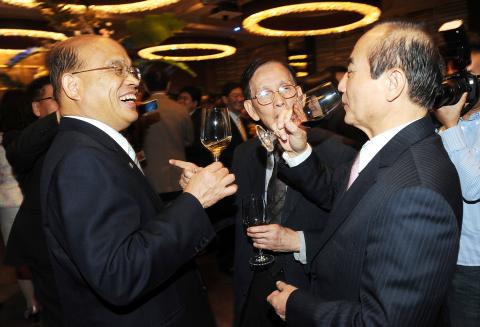|
DPP attacks SID for
spying on it, others
‘NEXT’ STORY: The report says the SID provided
Ma Ying-jeou with details of Wang Jin-pyng’s schedule and meetings and a call
between Ker Chien-ming and Rex How
By Chris Wang / Staff reporter

Democratic Progressive Party
Chairman Su Tseng-chang, left, and Legislative Speaker Wang Jin-pyng, right,
talk at a party held by the Japanese representative office in Taipei yesterday
to celebrate Japanese Emperor Akihito’s birthday.
Warning: Excessive consumption of alcohol can damage your health.
Photo: Lo Pei-der, Taipei Times
The Democratic Progressive Party (DPP)
yesterday condemned the Special Investigation Division’s (SID) reported
political surveillance of the party and several individuals, saying that
President Ma Ying-jeou (馬英九) and officials in charge should be held accountable.
The latest edition of the Chinese-language weekly Next Magazine yesterday
reported that the division carried out political surveillance of Legislative
Speaker Wang Jin-pyng (王金平), the DPP and a publisher who has voiced opposition
to the cross-strait service trade agreement.
In a report that Prosecutor-General Huang Shih-ming (黃世銘) submitted to Ma
briefing the president on Wang’s alleged involvement in improper lobbying for
DPP caucus whip Ker Chien-ming (柯建銘), the SID attached information unrelated to
the case, Next said.
Huang’s report and his meetings with Ma on Aug. 31 and Sept. 1 were the
precursor to a crisis that came to be labeled the “September Strife,” in which
Ma is alleged to have conpired to remove Wang as speaker.
The magazine said the additional information included in the report provided a
detailed account of Wang’s public and private itineraries, and the people he met
with.
Next said the division had wiretapped a telephone conversation between Ker and
DPP Chairman Su Tseng-chang (蘇貞昌) about the party’s strategy toward the Taiwan
Solidarity Union’s (TSU) initiative to recall Ma, as well as the conversation
between Ker and publisher Rex How (郝明義) about How’s plan to speak out against
the trade service pact on June 19, one day before it was to be signed.
If the Next story is true, it means that thanks to the division’s wiretaps, Ma
knew that the DPP was not going to support the TSU’s recall campaign and its
collaboration with How on opposing the trade pact.
The magazine said the SID had crossed the “red line of any democratic
government” to become a political tool for Ma.
“The [Next] report shows that our suspicion that Ma is monitoring his rivals is
legitimate. Ma is obligated to offer a clear explanation about the allegations
and the government officials involved in the surveillance should step down,” Su
said yesterday.
The Chinese Nationalist Party (KMT) was known for monitoring democracy advocates
during the authoritarian era, but what is surprising is that such surveillance
has been “a hard habit to break” for the party since it returned to power in
2008, he said.
However, SID spokesman John Chang (張進豐) said that Wang’s schedules on June 28
and June 29 were public information that investigators gathered by searching
Google.
The investigators wanted to compare Wang’s schedule for those two days with his
actual whereabouts — as identified by mobile phone base stations — to find out
if Wang had met then-minister of justice Tseng Yung-fu (曾勇夫) and Ker to discuss
a legal case involving Ker, he said.
The division denied conducting any politically motivated monitoring for Ma,
saying that its wiretapping of Ker’s phones and recording of the conversations
had been authorized by the Taipei District Court.
Meanwhile, during the KMT Central Standing Committee’s meeting yesterday, Ma,
who doubles as KMT chairman, denied ordering the SID to compile Wang’s schedule
as part of the probe into his alleged improper lobbying.
“I would never conduct a political investigation [against Wang]. The special
report Huang presented to me is in the hands of the prosecutors, and the answer
is in the prosecutors’ office,” he said.
He said the division’s report on the lobbying case did not include Wang’s
schedule or How’s decision to criticize the agreement.
KMT spokesman Yang Wei-chung (楊偉中) later accused Su of criticizing the president
based on inaccurate stories.
Additional reporting by Rich Chang and Mo Yan-chih
|
![]()
![]()
![]()